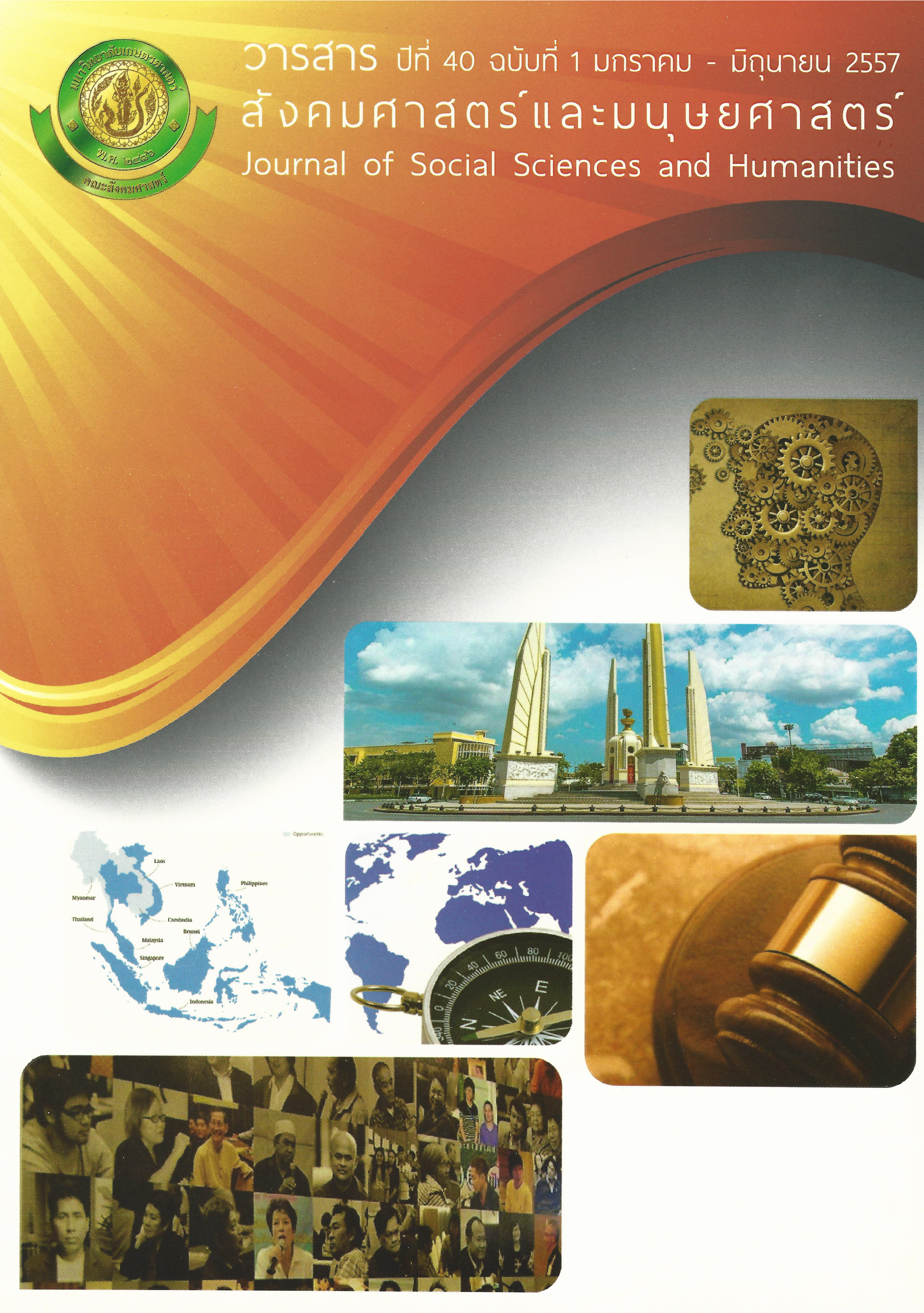กลไกการป้องกันตนเองจากการบริโภคเครื่องดื่มแอลกอฮอล์ ของนักศึกษามหาวิทยาลัยราชภัฏจันทรเกษม
Main Article Content
บทคัดย่อ
การวิจัยนี้เป็นการวิจัยเชิงคุณภาพ มีวัตถุประสงค์หลักเพื่อศึกษาสาเหตุของพฤติกรรมการดื่มเครื่องดื่มแอลกอฮอล์ของนักศึกษา 3 กลุ่ม ได้แก่ กลุ่มที่ไม่บริโภคเครื่องดื่มแอลกอฮอล์ กลุ่มที่บริโภคเครื่องดื่มแอลกอฮอล์และหยุดและ/หรือเลิกดื่ม และกลุ่มที่บริโภคเครื่องดื่มแอลกอฮอล์และกำลังพยายามจะเลิกการบริโภคเครื่องดื่มแอลกอฮอล์ นอกจากนี้ยังศึกษากลไกการป้องกันตนเองจากการบริโภคเครื่องดื่มดังกล่าวของนักศึกษามหาวิทยาลัยราชภัฏจันทรเกษม เก็บข้อมูลด้วยวิธีการสัมภาษณ์เชิงลึก ศึกษาตัวอย่างกลุ่มละ 6 คน ด้วยวิธีการ เลือกตัวอย่างแบบบอกต่อ รวมทั้งสิ้น 18 คน ผลการศึกษาสรุปได้ดังนี้
สาเหตุของการดื่มเครื่องดื่มแอลกอฮอล์ของนักศึกษาทั้งหมดมี 4 ประการ ได้แก่ สภาพแวดล้อมทางครอบครัว กล่าวคือสมาชิกส่วนใหญ่ในครอบครัวมีพฤติกรรมการดื่มเป็นประจำและบางกรณีชวนลูกดื่มด้วย ประการที่ 2 เพื่อนชวน และอยากลอง ประการที่ 3 บริเวณที่พักอาศัยมีสถานบันเทิงและร้านขายเครื่องดื่มดังกล่าวทำให้เข้าถึงได้ง่าย และประการสุดท้าย นักศึกษามีทัศนคติที่ดีต่อการดื่มเครื่องดื่มแอลกอฮอล์ว่าเป็นแสดงถึงความเป็นผู้ใหญ่ เป็นการเข้าสังคมและเข้ากับเพื่อนได้ง่ายเชื่อมความสัมพันธ์ในการทำงาน และช่วยคลายเครียด สาเหตุของการไม่ดื่ม เลิกดื่ม และพยายามเลิกเป็นสาเหตุที่ใกล้ตัว กล่าวคือ การมุ่งอนาคต เช่น อยากมีงานที่ดีและมีเกียรติทำในอนาคต และการควบคุมตนเองเกี่ยวกับผลการเรียน เห็นพฤติกรรมที่ไม่เหมาะสมของบุคคลใกล้ชิด เห็นคุณค่าของเงินและการให้คำสาบาน นักศึกษาส่วนใหญ่รับรู้โทษของการดื่มเครื่องดื่มแอลกอฮอล์ ว่าทำให้เสียการเรียนบั่นทอนสุขภาพ และทำให้เกิดอุบัติเหตุได้ แต่ไม่สามารถเชื่อมโยงความเสียหายที่เกิดผลกระทบเป็นลูกโซ่ต่อสังคมได้
นอกจากนี้ การศึกษากลไกการป้องกันตนเอง พบว่านักศึกษาทั้งหมดยังไม่มีกลไกในการป้องกันตนเองอย่างเป็นรูปธรรมที่ยั่งยืนได้ แต่มีวิธีการป้องกันตนเองได้ระดับหนึ่ง ด้วยการปฏิเสธและปฏิบัติตามคำปฏิเสธอย่างจริงจัง พยายามหลีกเลี่ยงไม่พบหรือไม่อยู่ในกลุ่มเพื่อนที่ดื่ม หลีกเลี่ยงสถานที่ที่มีการขาย และพยายามหันมาทำกิจกรรมที่ตนชอบในเวลาว่าง สำหรับกลุ่มที่ 3 พบว่าพยายามลดปริมาณ และความถี่ของการดื่มเท่านั้น เมื่อพิจารณาสภาพทางสังคมในการดื่ม พบว่าทั้งนักศึกษาหรือบุคคลอาชีพใดก็ตามยังมีทัศนคติที่ดีต่อการดื่มและ สามารถเข้าถึงเครื่องดื่มแอลกอฮอล์ได้ง่าย ดังนั้นหากบุคคลเหล่านี้ไม่สามารถควบคุมตัวเองได้ดีก็อาจหันกลับมาดื่มอีก หรือผู้ที่ไม่เคยดื่มอาจมีพฤติกรรมเช่นนี้ได้
Self-protection Mechanisms Against Alcoholic Consumption Among Students of Chandrakasem Rajabhat University
The purposes of this qualitative research were two folds. First, it examine the causes of alcoholic consumption in three groups of students: those who were non-alcoholic, those who used to drink but stopped and/or finally quit, and the last group still drank and tried to quit drinking. Second, it focused on the students’ self-protection mechanism against alcoholic consumption. The data were collected by in -depth interview with 18 students divided in to 3 groups of 6 each, selected by the snowball method.
There were four causes of all students’ alcoholic consumption. The first was family environment, especially when the majority of family members drank regularly. In some cases, the parents even persuaded them to drink. Secondly, it was their friends’persuasion and their own desire to try drinking. Thirdly, their residential areas had entertaining places and stores selling alcoholic drinks with easy access. Finally, it was their attitude towards drinking as the means of adulthood, being socialized and getting along well with friends, for work connection, and relaxation. The causes for not drinking, to quit drinking, and trying to quit derived from the students themselves. They cited the strive for their future, for instance, the desire for a good and respectable job, self-control for the study achievement, watching their close acquaintances’ improper behavior, awareness of money loss and intended to keep their oath. Most of them perceived disadvantages of drinking which could lead to study failure, being unhealthy, and accidents. However, they couldn’t associate the ensuring damage to society.
Concerning the self–protection mechanism, all students did not have the tangible and endurable ones, but they had some mechanism at certain level. It indicated that they could refuse and were determined not to drink seriously. They alsotried not to be with friends who drank and avoided being around the alcoholic as well as premises that sold alcoholic drinks, and tried to join pleasant activities during their leisure time. While the third group of students tried to lessen their drinking in terms of quantity and frequency. As a matter of social condition of drinking, the study found that not only students but also other professions had positive attitude toward drinking and could approach drinking quite easily. Therefore, if they could not control themselves well, they might return to drink again or even for those who were non-alcoholic could turn to have such alcoholic behavior as well.


